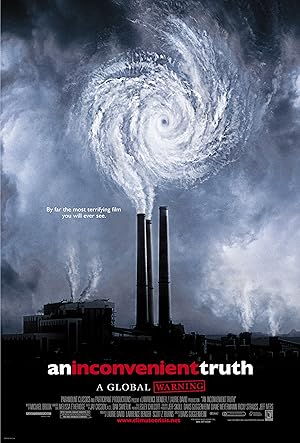
An Inconvenient Truth Page #7
this is what would happen
to the sea level in Florida.
This is what would happen
to San Francisco Bay.
A lot of people live in these areas.
The Netherlands,
one of the low countries.
Absolutely devastating.
The area around Beijing that's home
to tens of millions of people.
Even worse, in the area
around Shanghai,
there are 40 million people.
Worse still, Calcutta,
and to the east, Bangladesh,
the area covered includes
Think of the impact of a couple
hundred thousand refugees
when they're displaced
by an environmental event.
And then imagine the impact
Here's Manhattan.
This is the World Trade Center
memorial site.
And after the horrible events of 9/11,
we said, "Never again."
But this is what would happen
to Manhattan.
They can measure this precisely,
just as the scientists could
predict precisely
how much water would breach
the levees in New Orleans.
The area where the World Trade Center
Memorial is to be located
would be underwater.
Is it possible that we should prepare
against other threats besides terrorists?
Maybe we should be concerned
about other problems as well.
1.3 billion people.
An economy that's surging.
More and more energy needs.
Massive coal reserves.
The coal belt in Northern China,
- Inner Mongolia.
- Right.
Then there's Shaanxi province.
- And also biggest coal mine here.
- Up here.
- Yeah.
- Now, is that an open pit mine?
- Yes.
- Yes.
Every time I've visited China,
I've learned from their scientists.
They're right on the cutting edge.
Give me some sense of the numbers of
new coal fire generating plants.
Well, I have to say
that the number is enormous
because it's so profitable.
This issue is really the same for China
as it is for the US.
We are both using old technologies
that are dirty and polluting.
... more flooding and more drought
and stronger storms is going up,
and global warming is implicated
in the pattern.
And if you were to give some
suggestions to everybody here
about, like, what we can do
for the situation now.
Separating the truth from the fiction
and the accurate connections
from the misunderstandings
is part of what you learn here.
But when the warnings are accurate
then we as human beings,
whatever country we live in,
have to find a way to make sure
that the warnings are heard
and responded to.
We both have a hard time
shaking loose the familiar patterns
that we've relied on in the past.
We both face completely
unacceptable consequences.
that are causing this collision,
and the first is population.
When my generation, the baby boom
generation, was born after World War II,
the population had just crossed
the two billion mark.
Now, I'm in my 50s,
and it's already gone
to almost six and a half billion.
And if I reach the demographic
expectation for the baby boomers,
it'll go over nine billion.
So if it takes 10,000 generations
to reach two billion
and then in one human lifetime, ours,
it goes from two billion to nine billion,
something profoundly different's
going on right now.
We're putting more pressure
on the Earth.
Most of it's in the poorer nations
of the world.
This puts pressure on food demand.
It puts pressure on water demand.
It puts pressure on vulnerable
natural resources,
and this pressure's one of the reasons
why we have seen all the devastation
of the forest,
not only tropical, but elsewhere.
It is a political issue.
This is the border between Haiti
and the Dominican Republic.
One set of policies here,
another set of policies here.
Much of it comes not only
because of cutting, but also burning.
Almost 30% of all the CO2 that goes up
each year into the atmosphere
comes from forest burning.
This is a time-lapse picture of the Earth
at night over a six-month period
showing the lights of the cities in white
and the burning forests
and brush fires in red.
The yellow areas are the gas flares,
like these in Siberia.
And that brings me to the second factor
that has transformed our relationship
to the Earth.
The scientific and technological
revolution is a great blessing
in that it has given us
tremendous benefits
in areas like medicine
and communications.
But this new power that we have
also brings a responsibility
to think about its consequences.
Here's a formula to think about.
Old habits plus old technology
have predictable consequences.
Old habits that are hard to change
plus new technology
can have dramatically
altered consequences.
Warfare with spears
and bows and arrows
that's one thing.
But then a new technology came.
We have to think differently about war
because the new technologies
so completely transformed
the consequences of that old habit
that we can't just mindlessly continue
the patterns of the past.
In the same way, we have always
exploited the Earth for sustenance.
For most of our existence,
we used relatively simple tools.
The plow, the tractor.
But even tools like shovels
are different now.
Shovel used to be this.
Shovels have gotten bigger.
And every year, they get more powerful.
So our ability to have an effect,
in this case on the surface of the Earth,
is utterly transformed.
You can say the same thing
about irrigation, which is a great thing.
But when we divert rivers
without considering the consequences,
then sometimes rivers no longer
reach the sea.
There were two rivers in Central Asia
that were used
by the former Soviet Union
for irrigating cotton fields unwisely.
The Aral Sea was fed by them.
It used to be the fourth largest
inland sea in the world.
When I went there,
I saw this strange sight
of an enormous fishing fleet
resting in the sand.
This is the canal that the fishing
industry desperately tried to build
to get to the receding shoreline.
Making mistakes in our dealings
with nature can have
bigger consequences now
because our technologies are often
bigger than the human scale.
When you put them all together,
they've made us a force of nature.
And this is also a political issue.
This is a computer map of the world
that distorts to show the relative
contributions to global warming.
In our country, we are responsible
for more than all of South America,
all of Africa, all of the Middle East,
all of Asia, all combined.
The per capita average in Africa, India,
China, Japan, EU, Russia.
There's where we are.
Way, way above everyone else.
If you take population into account,
it's a little bit different.
China's playing a bigger role,
so is Europe.
But we are still by all odds
the largest contributor.
And so it is up to us to look
at how we think about it,
because our way of thinking
that transforms our relationship
to the Earth.
If a frog jumps into
a pot of boiling water,
it jumps right out again
because it senses the danger.
Translation
Translate and read this script in other languages:
Select another language:
- - Select -
- 简体中文 (Chinese - Simplified)
- 繁體中文 (Chinese - Traditional)
- Español (Spanish)
- Esperanto (Esperanto)
- 日本語 (Japanese)
- Português (Portuguese)
- Deutsch (German)
- العربية (Arabic)
- Français (French)
- Русский (Russian)
- ಕನ್ನಡ (Kannada)
- 한국어 (Korean)
- עברית (Hebrew)
- Gaeilge (Irish)
- Українська (Ukrainian)
- اردو (Urdu)
- Magyar (Hungarian)
- मानक हिन्दी (Hindi)
- Indonesia (Indonesian)
- Italiano (Italian)
- தமிழ் (Tamil)
- Türkçe (Turkish)
- తెలుగు (Telugu)
- ภาษาไทย (Thai)
- Tiếng Việt (Vietnamese)
- Čeština (Czech)
- Polski (Polish)
- Bahasa Indonesia (Indonesian)
- Românește (Romanian)
- Nederlands (Dutch)
- Ελληνικά (Greek)
- Latinum (Latin)
- Svenska (Swedish)
- Dansk (Danish)
- Suomi (Finnish)
- فارسی (Persian)
- ייִדיש (Yiddish)
- հայերեն (Armenian)
- Norsk (Norwegian)
- English (English)
Citation
Use the citation below to add this screenplay to your bibliography:
Style:MLAChicagoAPA
"An Inconvenient Truth" Scripts.com. STANDS4 LLC, 2025. Web. 23 Feb. 2025. <https://www.scripts.com/script/an_inconvenient_truth_2787>.







Discuss this script with the community:
Report Comment
We're doing our best to make sure our content is useful, accurate and safe.
If by any chance you spot an inappropriate comment while navigating through our website please use this form to let us know, and we'll take care of it shortly.
Attachment
You need to be logged in to favorite.
Log In